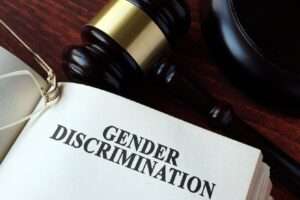The Volokh Conspiracy
Mostly law professors | Sometimes contrarian | Often libertarian | Always independent
Supreme Court Reaffirms Rule that Discrimination Based on Sexual Orientation is Sex Discrimination
Yesterday's ruling in Ames v. Ohio Department of Youth Services unanimously applies this once-contested principle.

Yesterday's unanimous Supreme Court decision in Ames v. Ohio Department of Youth Services is primarily notable for the ruling that members of "majority" groups alleging employment discrimination under Title VII of the Civil Rights Act of 1964 must not be held to a higher standard of proof than members of "minority" groups. That holding is correct for both the reasons advanced by Justice Ketanji Brown Jackson's opinion for the Court, and the additional points made in Clarence Thomas's concurring opinion (joined also by Neil Gorsuch). But there is another noteworthy element of the ruling that also deserves attention: it reaffirms the rule that discrimination based on sexual orientation is a form of sex discrimination.
Marlean Ames, the plaintiff in the case, explicitly argued that she was a victim of discrimination based on sexual orientation, not generalized discrimination against women, as such. She claims she got passed over for a promotion and then later demoted because she is a heterosexual woman, and her employer - the Ohio Department of Youth Services - discriminated against her in favor of gays and lesbians (first, a lesbian woman, and then a gay man). Nonetheless, all nine justices appear to agree this is a form of discrimination covered by Title VII's ban on discrimination based on sex.
In this case, the sexual orientation discrimination was discrimination against heterosexuals. But, obviously, the same logic applies to the far more common type of sexual orientation discrimination aimed at LGBT people.
The Supreme Court first ruled that sexual orientation discrimination qualifies as sex discrimination under Title VII in Bostock v. Clayton County (2020) (see my analysis of the ruling here and here). At that time, the ruling was highly controversial and three conservative justices (Kavanaugh, Thomas, and Alito) forcefully dissented. In Ames, by contrast, there is not so much as a hint of disagreement. That doesn't mean the Bostock dissenters have changed their minds. But it does suggest there is little or no support on the Court for trying to overrule that decision, or the general principle underlying it. Otherwise, I would have expected one or more conservative justices to at least write a concurring opinion indicating they are backing the majority only because of adherence to stare decisis.
The principle that sex orientation is sex discrimination goes beyond the Title VII employment context. It also applies to the issue of discrimination under the Equal Protection Clause of the Fourteenth Amendment. Back in 2015, Northwestern University law Prof. Andrew Koppelman and I filed an amicus brief in Obergefell v. Hodges (see also shorter summary of our argument here), urging the Court to strike down laws banning same-sex marriage on that basis. The Court instead invalidated them on different, more dubious, grounds. It is not clear to what extent those grounds also invalidate other types of state discrimination against LGBT people.
But if the Court - including all or most of the conservative justices - now accepts that sexual orientation discrimination is sex discrimination, that logic covers discrimination outside the marriage context. And, as Justice Gorsuch's majority opinion in Bostock holds, it applies to discrimination against transgender people, as well as discrimination against gays and lesbians.
As I argued back when Obergefell was decided, the sex discrimination approach offers a much clearer and more generally applicable standard for assessing sexual orientation discrimination claims than the hodgepodge of reasoning advanced by Justice Anthony Kennedy's opinion for the Court. It renders all state-enforced discrimination against LGBT people presumptively unconstitutional.
That doesn't necessarily mean all such discrimination must be struck down. Sex discrimination is subject to heightened "intermediate" scrutiny under which laws that discriminate on that basis can only be upheld if they are "substantially related" to an "important state interest." In some situations - most obviously segregated bathrooms and sports teams - courts generally accept sex discrimination in contexts where racial discrimination (subject to "strict" scrutiny) is forbidden. That has potential implications for situations where, e.g., transgender women seek to play on women's sports teams.
But when governments discriminate against LGBT people in situations where more conventional sex discrimination against men or women is forbidden, the anti-LGBT discrimination must also be struck down. If Marlean Ames qualifies as a victim of sex discrimination, the same is true of, for example, LGBT people discriminated against in state education programs, denied adoption rights available to heterosexuals, and so on.


Show Comments (69)